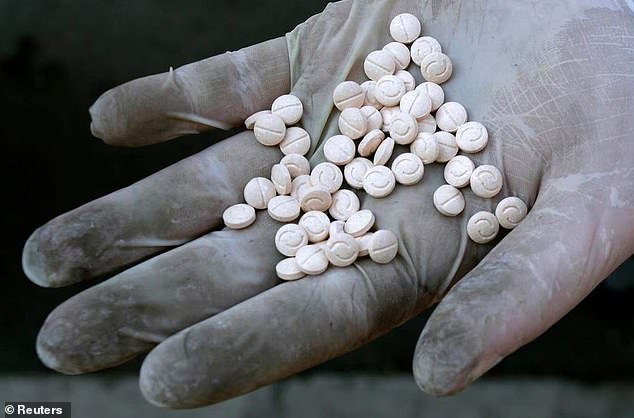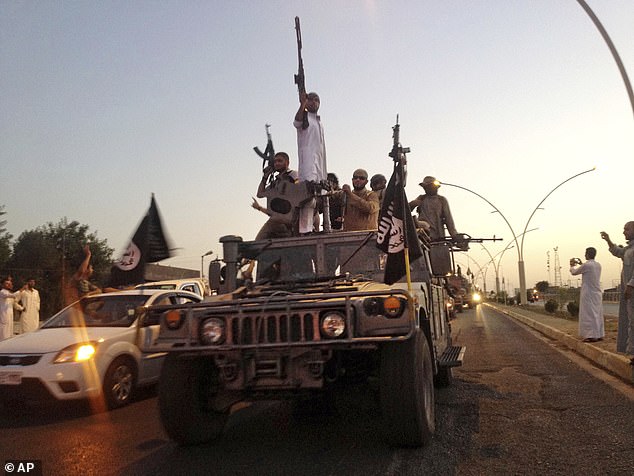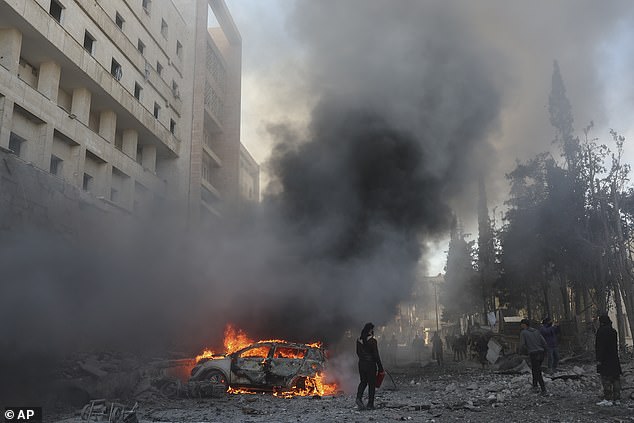Under murderous dictator Bashar al-Assad, Syrians faced years of mass repression over alleged drug use, often receiving long sentences in prisons where they were subjected to horrific torture.
But for years, the hypocritical tyrant’s regime secretly made three times more money than all the Mexican cartels, according to one estimate, from a little white pill that everyone from ISIS terrorists to construction workers was after.
Known locally as the ‘drug of jihad’ and ‘poor man’s cocaine’, Captagon was originally marketed as a drug for attention deficit disorder, narcolepsy and depression when it was first developed by a German pharmaceutical company in 1961. In 1986, Captagon was banned in almost all countries after being listed as a Schedule II drug by the UN.
But junkies discovered the drug was a cheap and quick way to get huge bursts of energy and productivity, alertness and sometimes a sense of euphoria. As a result, it became the drug of choice for everyone from high-end partiers to construction site workers and even terrorists.
Israeli media reported that Hamas fighters pumped themselves full of the drug just before carrying out their deadly Oct. 7 massacre, killing about 1,200 people and kidnapping a total of 251.
ISIS fighters were also known for their use of the drug, experts said CNN in 2015 that it made people feel impervious to bullets.
‘You can stay awake for days. You don’t need to sleep,” Dr. Robert Keisling, a psychiatrist at MedStar Washington Hospital Center, told the outlet.
In Raqqa, Syria, a heavyset jihadist dressed in military gear and a black balaclava is seen swinging a four-foot sword at his victim’s head.

Under the murderous dictator Bashar al-Assad (photo), Syrians faced mass repression for years over alleged drug use

A customs officer shows Captagon pills, part of the 789 kilograms of drugs seized, before they are burned in Sofia, 12, 2007
‘It gives you a feeling of well-being and euphoria. And you think you’re invincible and that nothing can hurt you.’
Syria is responsible for about 80% of Captagon’s global production, and for years Bashar al-Assad, now deposed thanks to a lightning offensive led by an Islamist rebel group, was a major player in the industry.
In 2021 alone, $5.7 billion worth of pills were sold.
Experts estimate that Assad’s illicit trade in Captagon was worth “about three times the combined trade of the Mexican cartels.”
A 2021 investigation by the New York Times found that much of the drug’s production and distribution in the country was overseen by the Syrian Army’s Fourth Armored Division, an elite unit commanded by Maher Assad, the younger brother of Bashar.
Intelligence sources in the region say Captagon is still produced in small factories along the Syrian-Lebanese border, as well as in larger factories closer to Syria’s border with Jordan.
Some quantities are also produced in Lebanon, with the help of Hezbollah, according to security sources.
Despite its lucrativeness, Assad gradually began to move away from the trade in the years before his regime fell, in an effort to rebuild his fractured relations with other Arab states.

In this June 23, 2014, file photo, Islamic State group fighters parade in an Iraqi Security Forces armored vehicle in the northern city of Mosul, Iraq.

A car burns after an airstrike next to a hospital in Idlib, Syria, Monday, December 2, 2024
Jordan, Saudi Arabia and the UAE have long viewed Captagon as a scourge on their nations and devoted significant resources to cracking down on smuggling operations.
In February 2022, the Jordanian military said it had killed 30 smugglers in just two months and foiled attempts to smuggle 16 million Captagon pills from Syria, a quantity far greater than the total seized in 2021.
Months later, in August 2022, Saudi Arabia said it had discovered 46 million pills smuggled in a shipment of flour.
And in February 2023, a man was arrested in Abu Dhabi, UAE, for trying to get 4.5 million Captagon pills in cans of green beans.
Last May, Assad reportedly allowed Jordan to kill a known Captagon dealer, Merhi al-Ramthan, in southern Syria with an airstrike, and allowed a Captagon factory near the Jordanian border to be destroyed.
The attacks came just a day before Syria was formally readmitted to the Arab League, from which the country was expelled in 2011 over Assad’s brutal crackdown on protesters in the run-up to Syria’s civil war.
“Assad gave assurances that he would deter the regime from supporting and protecting smuggling networks,” a former brigadier general in Jordan’s intelligence service, Saud Al-Sharafat, told The Associated Press. “For example, he facilitated the removal of al-Ramthan.”
Al-Ramthan was considered “the most prominent drug trafficker in the region, and the largest smuggler of drugs, including Captagon, into Jordan,” according to the Britain-based Syrian Observatory for Human Rights (SOHR).
But despite all the money Assad made, he simply could not prevent power from slipping from his hands.

